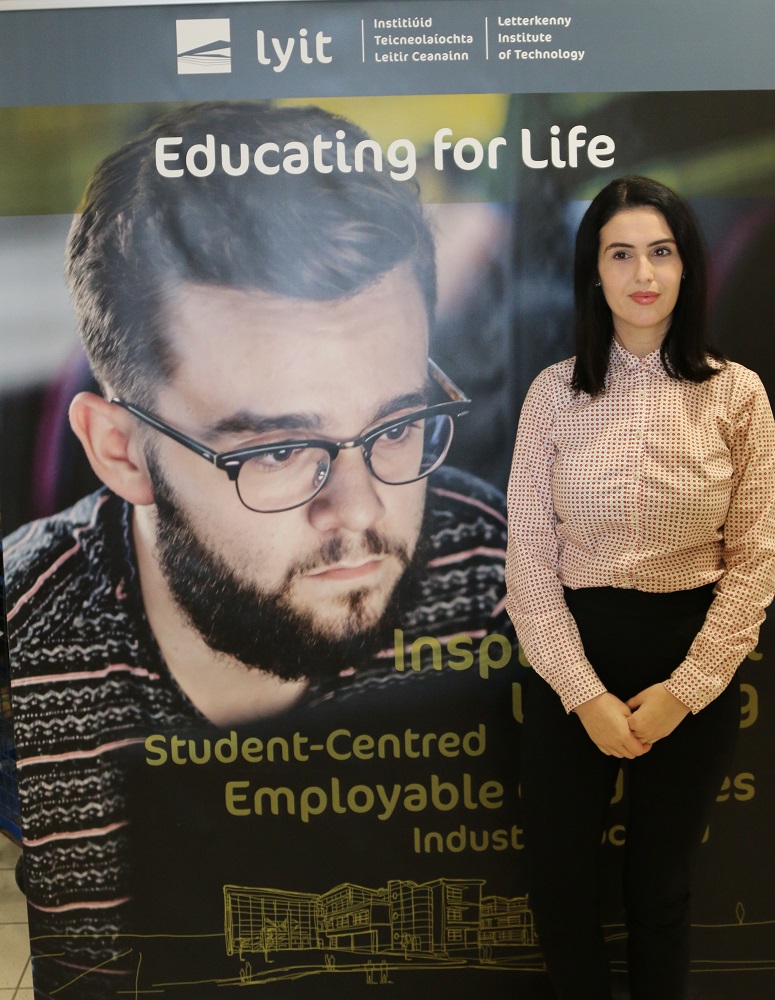An exciting study is underway in Letterkenny to examine wearable technology and COPD.
This study, directed by Letterkenny Institute of Technology (LYIT) and Letterkenny University Hospital, focuses on the application of wearable sensors to monitor physical activity and sleep in patients with Chronic Obstructive Pulmonary Disease (COPD).
The research was made possible by funding awarded to Bríd McDevitt from the Department of Computing in LYIT. It is the first time in 11 years that a student from LYIT has been awarded this type of competitive funding, with less than 1 in 5 applications being successful.
Dr. James Connolly, an expert in digital healthcare at LYIT, is the research supervisor. He explains that COPD is a lung disease characterised by chronic obstruction of lung airflow that interferes with normal breathing and is not fully reversible. “It is the most prevalent respiratory disease in adults, and it is estimated that at least 440,000 people in Ireland have COPD, with Ireland also having one of the highest standardised death rates for COPD within the European Union (EU). By 2030, COPD is expected to be the third leading cause of death worldwide and places a significant burden of disease on individuals, healthcare services and societies globally.”
One of the main symptoms of COPD is breathlessness which leads to a fear of exertion and avoidance of activity. This physical inactivity is associated with skeletal muscle depletion, de-conditioning, and poor prognosis. “It is therefore vital that patients with COPD be encouraged to remain as physically active as possible”, explains Bríd McDevitt, IRC awardee.
“Lack of physical activity also leads to poorer sleep quality and after breathlessness and fatigue, sleep-related complaints are ranked the third most frequent among COPD patients.”

Brid McDevitt, LYIT PhD Researcher
Pulmonary Rehabilitation (PR) is an interdisciplinary programme of exercise and education and is a standard of care for patients with COPD.
“PR has been shown to increase quality of life indicators, improve exercise tolerance and to reduce the frequency of hospital admissions. This programme has been developed in Donegal over the past 15 years by the provision of integrated community PR programmes close to patient’s homes. The Donegal programme is considered outstanding nationally and the programme was highly commended in the National Health and Social care Professional Innovation and Best Practice Awards in 2018.”
Despite initial improvements, there is variability in the benefits gained by patients who complete a PR programme. The improvements diminish to pre-intervention levels within 12 months of program completion, so certain challenges remain such as enhanced participation in daily life. “This research utilises wearable sensors to objectively monitor physical activity and sleep in participants with COPD. The wearable sensors require minimal intervention and can function without user input or battery recharging for several months so implementing a device with minimal user intervention will mean that patients can wear the device for long periods, including sleep, and study researchers will not need to continually interact with study participants”, explains Dr. Connolly.
The main aim of this interdisciplinary study is to examine whether completion of a PR programme can result in an increase in daily physical activity levels whilst reducing symptoms in patients with a confirmed diagnosis of COPD, and whether these results are sustained in the year following PR.
“A further outcome of the study would be to establish whether factors such as exacerbation rate, hospital admissions and sleep patterns are associated with changes in physical activity in the year post PR. The research will examine whether patients continue to improve after the initial study is complete and identify those factors that can influence post rehabilitation” concludes Ms McDevitt.
“This vital funding from the IRC which is the first in eleven years for LYIT will ensure that we conduct important interdisciplinary research in digital healthcare. Wearable sensors offer objective feedback on physical activity and sleep patterns in patients and this research has the potential to contribute to improvements in quality of life for COPD patients”.








